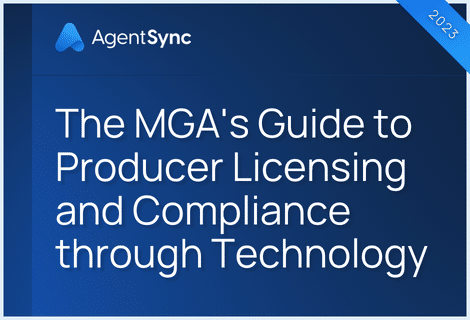

As an insurance producer, maintaining current knowledge of best practices and changing regulations is critical to both your success and the success of your client base. Like other states, Colorado requires producers to take ongoing educational courses to keep them up-to-date on these and other subjects.
Since maintaining your resident license in Colorado is key to maintaining your nonresident insurance licenses in other states, and meeting continuing education (CE) requirements is critical to maintaining your license, then CE is mission critical.
Of course, before you read on, we’d like to remind you that the AgentSync team believes the following information to be accurate but we’re no substitute for doing your own due diligence and ensuring you understand the specific laws and regulations that pertain to your unique circumstances in every state of operation.
What is the due date for Colorado Insurance CE Credits?
Happy birthday! Your CE and license renewal application are due the last day of your birth month every two years. The two-year cycle is based on the year you first obtained your license. This means every other year, the state of Colorado will email you a reminder 90 days before the month of your birthday that your CE and license renewal are coming due. So thoughtful, right?
Here’s a quick example: Greg got his insurance license on March 1 of 2023; his birthday is April 17. So, in 2025, Greg will need to complete his continuing education and renew his license by April 31.
Who’s exempt from Colorado Insurance CE?
Those with nonresident insurance licenses are considered compliant in Colorado as long as they are compliant with the CE requirements of their resident state. This means that as long as you have met the requirements of your home state, you aren’t required to complete any additional CE to maintain your nonresident insurance license(s) in Colorado.
Colorado state statutes also exempt producers operating under limited lines or restricted licenses – travel insurance, title, limited lines credit insurance, and crop hail – from being required to complete a full 24 hours of continuing education. But all other producers and adjusters are required to adhere to the full CE requirements that follow.
How many hours of CE are required for Colorado insurance producers?
Colorado resident insurance producers must take 24 hours of CE courses within each full biennial renewal cycle. This includes 3 hours of ethics, 18 hours concentrated in your major lines of authority, and 3 hours that can be miscellaneous subjects.
You can’t take the same CE course more than once in a two-year period, but Colorado allows you to carry over up to 12 excess credits if you earned them in the 120 days before your renewal deadline.
Colorado is part of the NAIC Continuing Education Reciprocity process, meaning Colorado license holders can access a sizable catalogue of courses from national providers.
While Colorado does not allow prelicensing courses for other lines of insurance to count toward your total, you can earn dual-credit CE while pursuing professional designations such as a Certified Financial Professional designation provided by the College for Financial Planning. Further, the state allows you to take courses online, via correspondence course or self study, company seminars (although the class may not be directed by your supervisor or anyone else at the company who has a vested interest in you passing), in a traditional classroom setting, or through computer-based training. All courses must be approved by Colorado state’s insurance administrator, Pearson VUE.
While there’s quite a broad range of what can qualify for CE, the state also outlines a few things that can’t qualify (3 CCR 702-1, Amended Regulation 1-2-4). The common sense summary is that courses that are about investing, growing your business, or basic business management aren’t about insurance, and thus don’t qualify. But, specifically, the state regulation says you can’t qualify for CE from courses that primarily are:
- Used to prepare for taking an insurance license exam
- About computer science and automation
- Motivational, sales training, or psychology courses
- Communication or relationship building
- About prospecting, marketing, or planning
- Intended to impart knowledge of office procedures, administrative matters, or personnel issues
- Related to service standards or service vendors
- Investment and other courses not directly related to insurance
- About time management
- About FINRA or SEC compliance
Colorado requires people who hope to sell annuities to take a one-time four-hour class. Even if you’re a nonresident, you must complete this requirement in Colorado or have completed a similar course in your resident state.
Similarly, in accordance with a standard set by the National Association of Insurance Commissioners, if you plan to sell long-term care insurance (LTCI), you should complete an eight-hour training course and ongoing CE of four hours specific to LTCI for each renewal cycle in Colorado. Again, Colorado requires even nonresident producers to have completed these terms either in Colorado or in your home state.
Of course, if you’re licensed to sell flood insurance, you must have three CE hours of the training requirements established by the Federal Emergency Management Agency’s National Flood Insurance Program, as well.
The state of Colorado also specifies that if you’re a resident producer licensed to sell property or personal lines insurance, you must complete three hours of CE specific to homeowner’s insurance coverage. Additionally, if you sell or adjust claims-made policies, you have to complete a one-time two-hour course about claims-made policies and receive a certificate of completion.
If you’re licensed for bail bonds and hoping to obtain an appointment with a bail insurance company, Colorado law Section 10-2-415.5, C.R.S. says you will need to have two hours of education about the criminal court system, two hours covering bail bond industry ethics, four hours covering bail bond laws, and 16 hours on the clock of training in bail bond recovery practices. These hours are in addition to Colorado’s other resident CE hour requirements.
For more information about state-specific licensing requirements, or to find out how AgentSync can make it easier to operate across multiple states, check out our state pages.
Colorado Insurance CE FAQs
How do I renew my expired Colorado insurance license?
If you miss renewing your license by the end of your biennial birthday month, your license will immediately be considered terminated by the state and you will need to submit a new application and pay a new license fee.

